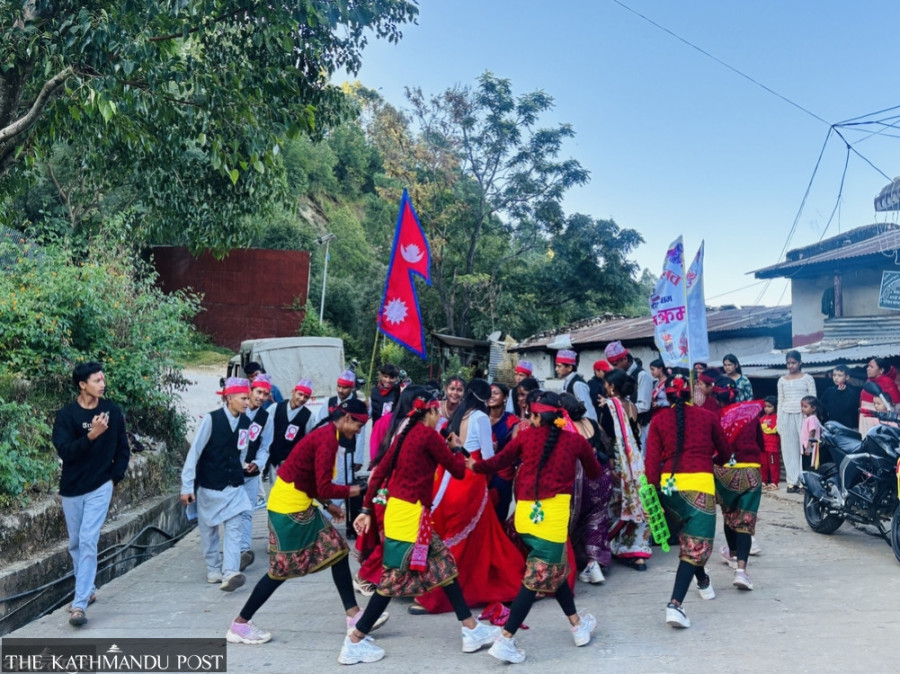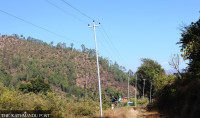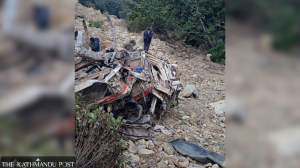Karnali Province
Centuries-old Tihar traditions fade in Sudurpashchim and Karnali villages
Once a celebration of sibling bonds and village culture, the iconic deuda songs now struggle to survive amid modern music trends.
Menuka Dhungana
Karnali Pul, Nasukyai Hajari Phool, a deuda song once inseparable from Bhai Tika celebrations in Sudurpaschim and Karnali villages, is fading from memory. Sung by Binod Bajurali and Bishnu Majhi, the song captured the bond between brothers and sisters, expressing love, longing, and separation.
Daju: Photo heri tika launu, yo saal aavai chaina.
Na ro bahini, Tihar samjhi, sahu bida dindaina.
Bahini: Saptarangi phoolka mala, uni rakhheki chu.
Daju aaune mul bato ma, kuri thakeki chu.
Daju: Banjungle ramailo hola, wai basanna nyaula.
Yai saal yattikai bhayo, arko saala aaula.
(Brother: Look at the photo and apply the tika. I won’t be coming this year.
Don’t cry, sister; the boss won’t grant leave even for Tihar.
Sister: I have prepared a garland of seven-coloured flowers.
I’ve waited on the main path for you, brother.
Brother: The forests and fields will be fun; I will definitely come next year.
This year, it’s only this much; I’ll come next Tihar.)
For decades, sisters would sing deuda, remembering brothers working in Indian cities, while brothers would respond from afar. The songs reflected familial affection and the emotional toll of migration. Brothers and sisters celebrated Tihar through these performances, especially during Bhai Tika, with songs often conveying longing, separation, and love.
Today, that spark is disappearing. Goma Jaisi, 55, of ward 5 in Mangalsen Municipality, said, “Earlier, the entire village would gather for deuda. Sisters remembered their brothers, brothers remembered sisters. Now, songs from commercial albums dominate. The lyrics and meaning are lost, and the cultural essence feels gone.”
Udayram Subedi, 71, added, “The madal rhythms and diverse deuda melodies that once filled the village are silent. Tihar now feels empty, a festival of noise rather than connection.”
Local elders note that younger generations prefer foreign music and dance, even during traditional festivals, sidelining local folk tunes, costumes, and rituals. Man Bahadur Bohara, 70, said, “In the past, festivals featured Bhuvo Nach, Hudke Nach, and deuda performances with panchay baja, reinforcing social harmony and cultural values. Youth groups from Turmakhand, Jaygarh, and Kamalbazaar, among other places would perform in Mangalsen. Today, the tradition is almost lost, and deuda is largely performed to collect donations rather than celebrate culture.”
The decline reflects broader social changes. Men still migrate for work in India, leaving women to manage households. Where sibling bonds were once publicly celebrated through music and dance, modern Tihar sees commercial songs and private celebrations replacing centuries-old rituals.
Once a symbol of village identity, sibling affection, and cultural continuity, the rhythm of the madal and voice of the deuda now barely resonate, signalling the erosion of a centuries-old Tihar tradition.




 22.17°C Kathmandu
22.17°C Kathmandu












